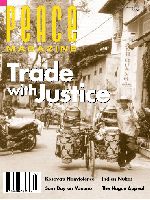
Peace Magazine Jan-Feb 1998, page 30. Some rights reserved.
Search for other articles by PMag staff here
The 1997 Gandhi Prize was awarded on October 2, 1997 to a British Columbia physician and peace educator, Dr. Mary-Wynne Ashford. The award is given every year on the birthday of Mohandas K Gandhi, whose legacy it celebrates. It was originated and sponsored by the late Natverlal Thakore, who taught philosophy of education at Simon Fraser University in the 1970s.
Dr. Ashford is a professor at the University of Victoria, teaching violence prevention and global education in the faculty of education. Her research and current activism focuses largely on the prevention of violence among adolescents. She was previously a physician in Victoria.
Drawn into the peace movement in the mid-1980s, she became President of Canadian Physicians for Prevention of Nuclear War (now Physicians for Global Survival). After the Gulf War, when public concern about nuclear weapons declined, she went back to university, received a Ph.D. in 1996, and serves actively today. The Gandhi Award honors creativity and commitment to truth, justice, and nonviolence.
The US Congress voted on November 13 to block the use of US weapons m occupied East Timor, placing an unprecedented restriction on US arms sales to Indonesia. The vote came as the White House was offering a $3 billion bailout for Indonesia, and on the eve of meetings invoking President Clinton, Defense Secretary Cohen, and General Suharto, Indonesia's longstanding dictator.
The Congressional vote was a blow to Suharto and may endanger all future weapons deals between Washington and Jakarta. The new legislation requires that any contract to sell lethal equipment to Indonesia "state that the United States expects that the items will not be used in East Timor." The East Timor Action Network (ETAN) praised the vote as a turning point in the worldwide campaign to end Indonesia's illegal occupation of East Timor. ETAN mounted an extensive grassroots campaign on behalf of the legislation.
East Timor Action Network (USA)
The US government is acknowledging that chemical and biological weapons are a significant threat, especially because terrorists can make them. The Pentagon is planing to buy additional protection suits, detection devices, and vaccines. All US military personnel will be inoculated against anthrax. Civilian authorities in 120 cities will be trained on how to respond to an attack. Hotels, transit authorities, fire, police, and hospital emergency rooms have been included in the training process. New York metropolitan hospitals plan to purchase vaccines against some biological agents and civilian field kits to identify them.
The New York Times reports that the idea of taking US and Russian nuclear missiles off alert is gaining popularity among nuclear weapons experts in both nations. A panel headed by Vice Admiral Dennis Cutler Blair of the Joint Chiefs of Staff is studying potential de-alerting techniques such as blocking missile silo lids or removing batteries or guidance circuit boards from the missiles.
However, Major General Donald G. Cook, the commander of the US 20th Air Force, stated, "as long as Russia's capability exists... their intentions could change overnight" He added, "The likelihood of an accidental launch is virtually zero. It takes multiple crews to launch. It takes a message from the president. It is very secure, very predictable."
Bruce G. Blair, a senior fellow at the Brookings Institution, stated, "The main nuclear threat today is not a deliberate, cold-blooded Russian attack. It is loss of Russian control over its arsenal. Both our forces are cocked on hair-triggers. Both sides can retarget a missile m seconds - just a few strokes on a keyboard."
I am actively involved with a number of groups, including APEC Alert and East Timor Alert. Midday on November 24,1 was walking between Brock Hall and the Student Union Building (SUB) on the UBC campus. Three men in suits said my name, grabbed me and pushed me to the ground violently, saying I was under arrest They did not show badges. I resisted, but am not very strong physically, nor am I a violent person. My hands were wrenched behind my back and cuffed tightly. I tried to scream for help, but my mouth was covered by someone 5 hands. An unmarked car screeched onto the scene and I was thrown into the back, head-first I later learned that other plain-clothes men kept passersby from intervening in what most likely looked like an abduction.
When I was allowed to sit up in the car, I asked what was going on and was shown badges and an arrest warrant I am charged with the assault of an campus security guard, though using a megaphone loudly at a rally on November 7. The charge is specious and outrageous. I have never aimed a megaphone directly at any officer's ears. It was concocted and executed the day before the major anti-APEC demonstrations at UBC.
At the Richmond detachment I had the opportunity to contact my lawyer and some friends and soon after was brought before Judge. The conditions of release were that I stay away from officer Goodrich (not a problem) and UBC campus. The second condition was a shameless attempt to keep me from participating in and organizing the demonstrations. I signed the condition of release fully intending to break it
On the drive back onto campus, I hid in the back seat of the car to prevent being spotted by the multitudes of police who had virtually turned UBC into a military zone. I was again arrested and spent three nights in jail. Oh November 25, more than forty protesters were brought in for the "Crash the Summit" demonstration.
My trial date is set for September 1, 1998.
Jaggi Singh

Peace Magazine Jan-Feb 1998, page 30. Some rights reserved.
Search for other articles by PMag staff here